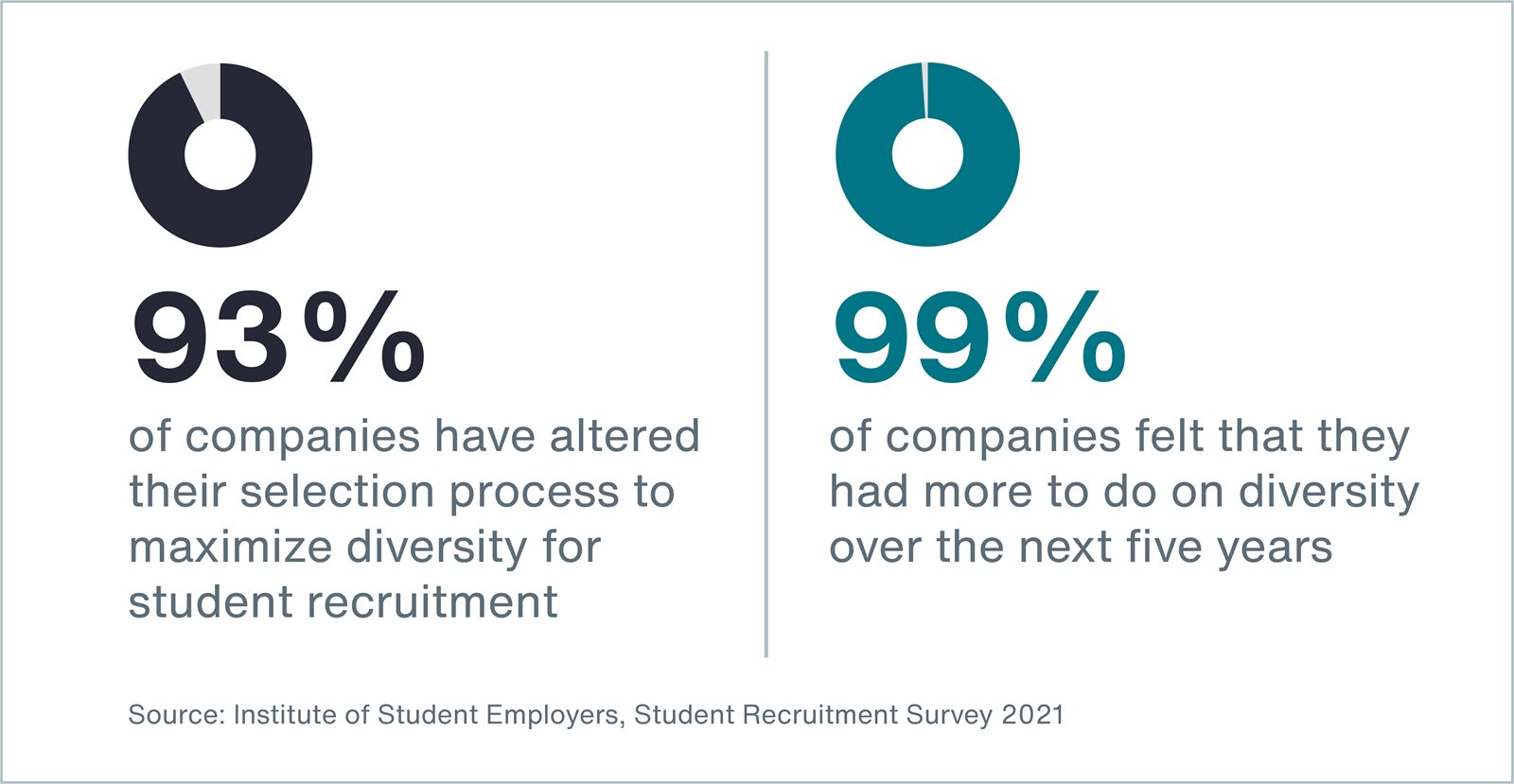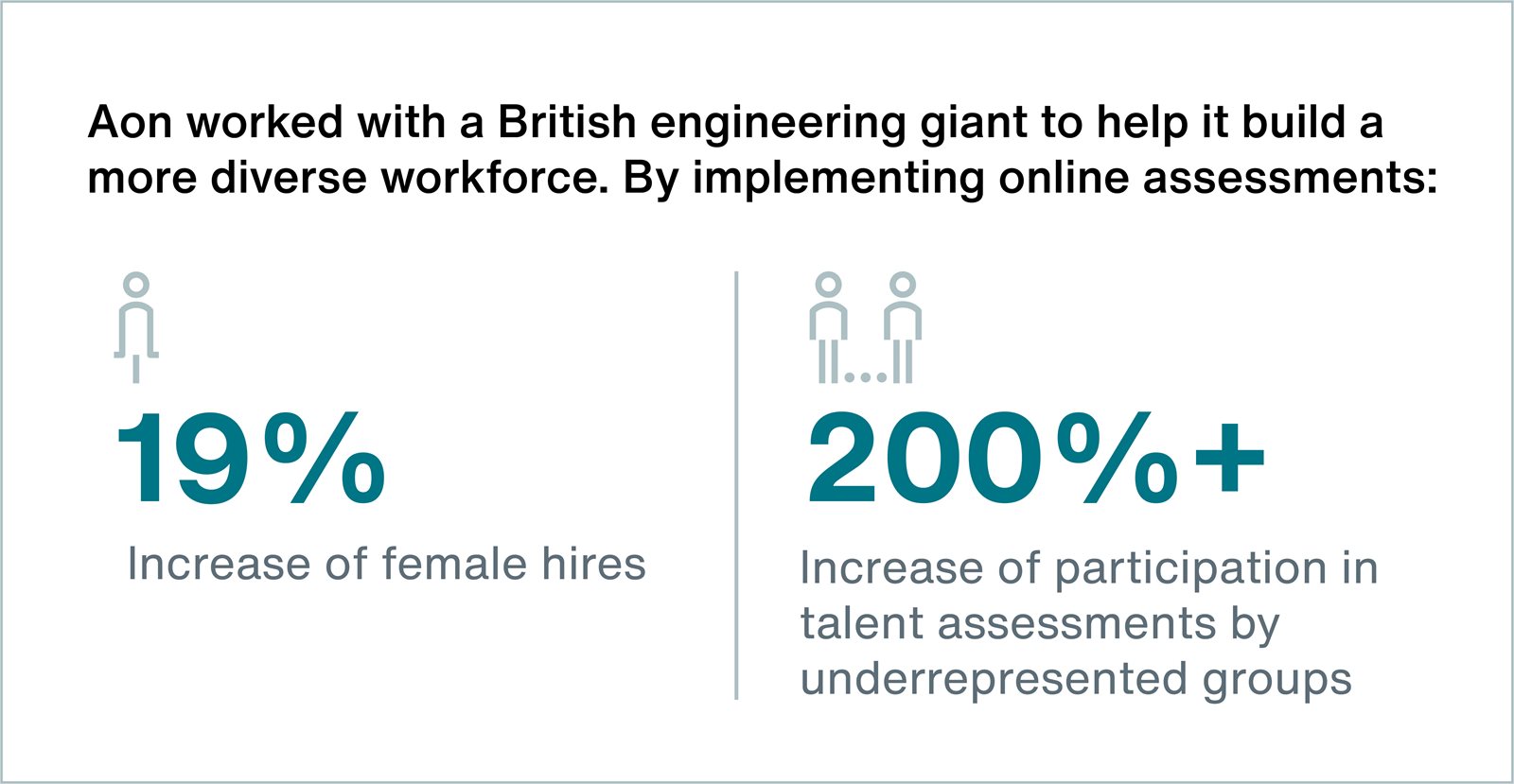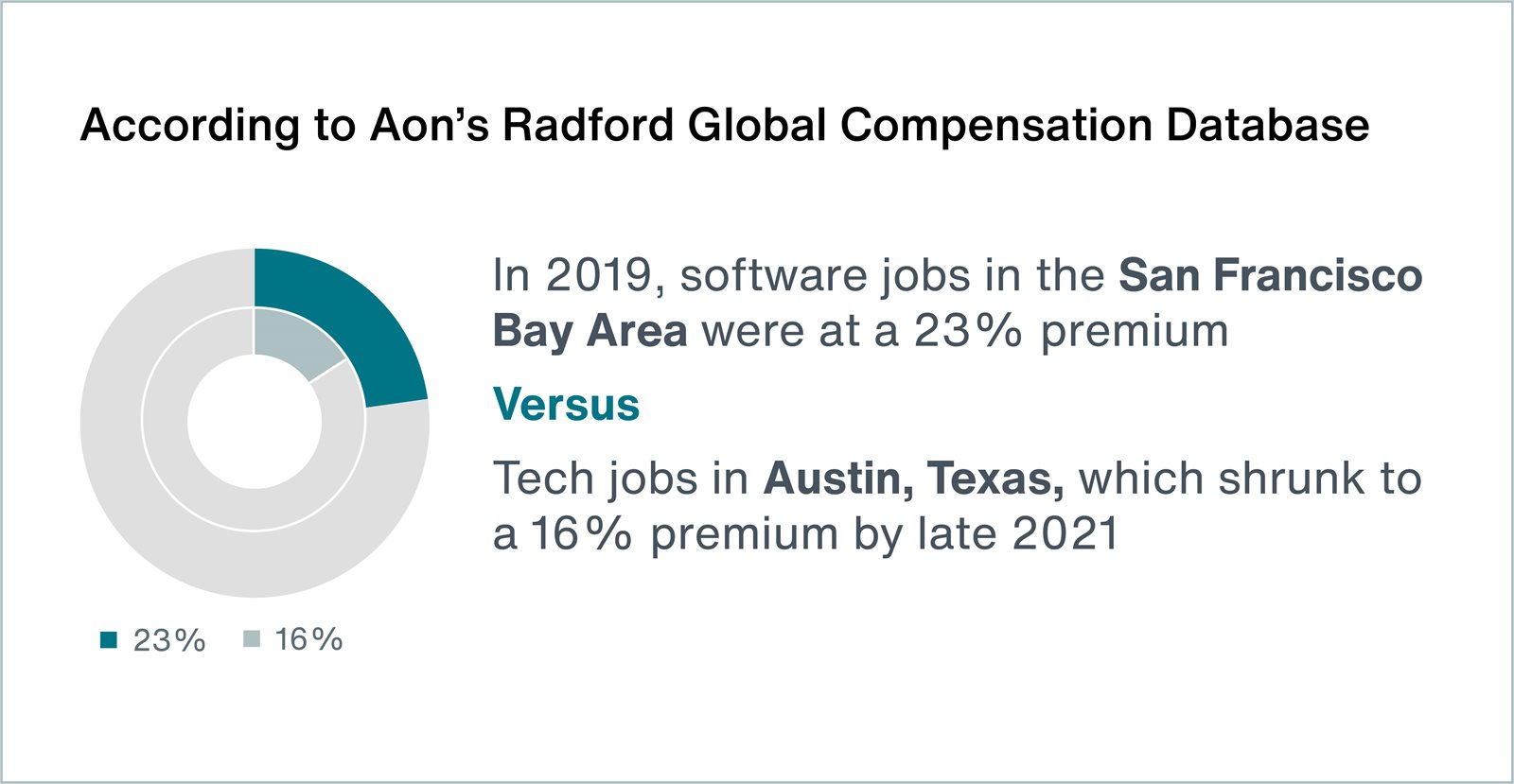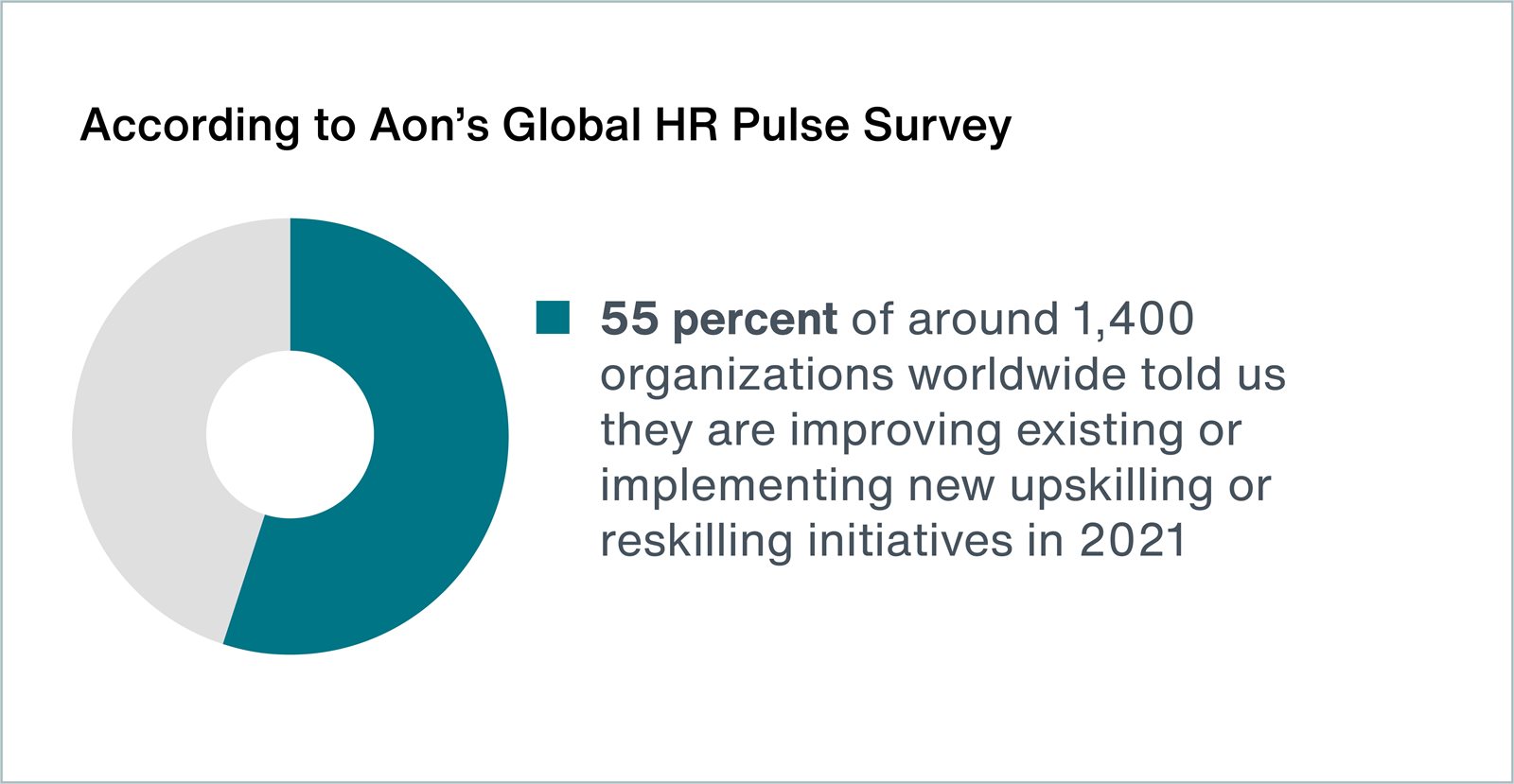HRHQ Sponsored Content
by Siobhan Kelly, Managing Director – Ireland, Aon’s Assessment Solutions
Companies are driven to improve their diversity, equity and inclusion (DE&I). One place to start is through widening talent pools and rethinking the skills needed for certain roles.
With the spread of remote working, organisations have become empowered to think more broadly about where and how people work. Other developments, such as the expansion of apprenticeship and internship programs, are also driving a new perspective on where companies can acquire talent and the type of talent they need.
The following five hiring trends open the door to new ideas, skills and most of all, the promise of improving workforce diversity.
Apprenticeships and Internships
Establishing effective and comprehensive early careers programs will attract recent graduates and enable them to explore new opportunities with your firm — from summer internships and apprenticeships to full-time rotational programs and more. They provide the means necessary for young professionals from all backgrounds to expand their experience, skills and interests, serving as a win-win for both the business and employee.

Apprenticeship and internship programs supply a stable, highly effective source of diverse talent and the foundation for building resilient future talent pipelines. Be sure to offer jobs that stretch their skills and provide clear career paths, rather than menial tasks, and pay them a fair wage for their time. This is especially important when hiring high potential early career talent, to ensure they don’t feel stagnant in an entry-level role.
Apprenticeship candidates aren’t just looking for a job. They typically want a career where they’re valued and developed. These bright possibilities should be reflected in the employer branding materials used to attract high-potential, entry-level employees. When firms invest more in better apprenticeship and internship practices, they invest more in their people, thus improving the hiring process. Even further, individuals will feel valued and be more likely to return to your firm. Businesses that put their people first are always more aligned to thrive. Our recently published article further discusses the benefits of internships on hiring and retention strategy goals.
Blockchain HR Technology
The future of work demands thinking beyond traditional hiring methods based on resumes and listed degrees. Partner with an initiative like The Velocity Network Foundation® (of which Aon is a founding member). Velocity uses new blockchain HR technology to credential candidates that may not have traditional backgrounds and long careers at various organisations.
Credentialing talent helps individuals vouch for themselves on their own terms and ultimately get the right job, bringing capabilities to the forefront of the decision-making process. Individuals who have contract or gig jobs, or who have specialisations and certifications instead of university degrees, are increasingly turning to blockchain technology that certifies them in their backgrounds. Companies should also recognise the value they can bring. By focusing on credentials, blockchain technology encourages individuals to avoid applying for one single job, which can be limiting, and instead apply more generally. In turn, companies can offer multiple career paths that fit their skills, motivation and capabilities, allowing them to reach their full potential.
Even more, this technology brings diversity to the forefront. Data provided by blockchain networks can help broaden the talent pool to address today’s complex market, while allowing for hiring managers to break through any potential biases and focus on the hard, trusted evidence of the candidate’s abilities. Getting a diverse range of job candidates through the door is half the battle. Learn more about this innovative approach to hiring in our article, “A New Era of Recruiting Promises to Democratise the Hiring Process and Boost Inclusion and Diversity.”
Watch this video to learn more about The Velocity Network.
Un-Biased Assessments
Organisations that use talent assessments that are known for removing certain subconscious bias to screen job candidates will experience more diverse hiring practices. By using fact-based information on candidates’ key strengths and talents, combined with sophisticated algorithms, the fairness and quality of the hiring process improves. The talent pool also widens. Incorporate online assessments that measure a candidate’s traits, motivating factors and values to determine their fit with your mission, vision and values.


If you are lucky enough to be attracting a large volume of candidates and need to screen further, consider using video interviews. Proven to be fairer and even more effective than human-rated interviews, AI platforms like Aon’s online video interviewing tool, vidAssess-AI is naturally quicker and uses less resources than the standard in-person interview.
Psychometric testing is another effective way to assess a candidate’s values and determine if they are aligned with the company’s core values. These tests offer a much more in-depth and scientifically sound exploration of each candidate’s abilities than traditional assessment methods like resumes and interviews, which can often inadvertently incorporate underlying biases in the hiring process.
Be careful to use assessments for the right reasons. Using tools to assess culture fit can invite bias into your hiring process. “Culture fit” typically refers to the norms, behaviors and perspectives that dominate your workplace. Hiring candidates who share these traits only replicates homogeneity in your workforce.
Remote Work
Allowing certain roles to operate remotely opens up new talent pools and will ultimately make attracting new talent easier — particularly for specialised and in-demand jobs. Consider hiring software engineers out of college locations such as Raleigh, Durham or Atlanta, versus the competitive hiring landscape of Silicon Valley. Similarly, individuals moving into new careers that are outside of locations that are hubs for certain industries will find new opportunities through the option of remote working.
In some cases, remote working has lessened geographic pay differentials in the technology sector, according to data from the Radford Global Compensation Database. Pay premiums in Silicon Valley versus smaller technology hubs such as Denver, Los Angeles and Austin have shrunk since the pandemic for certain technology jobs.


A broader talent pool means companies must revisit their competitor peer group, re-examine their approach to compensation benchmarking and focus on their brand and employee experience — an acute challenge, yet extremely important factor for employers with a significant portion of remote employees. Ensuring a company’s brand is strong and perceived accurately by prospective employees will help its talent acquisition strategy, which must rapidly evolve in a virtual working environment. We discuss these issues and provide additional advice in our article, “Talent Recruitment Has Changed: What it Means for Peer Groups, Benchmarking and Employee Experience.”
Talent Mobility
There is an urgent need to invest in upskill and reskill programs, as many organisations forecast a gap in their future skills capabilities. This gap cannot be closed by only bringing in new talent, particularly in the current environment where the labor market is competitive.


Enabling workforce agility is key to achieving this and must fostered by structures and control mechanisms that support sustainable value creation in terms of future skills, career mobility and growth. Eighty-five percent of HR professionals surveyed by Aon believe workforce agility is very or extremely important to their organisation’s future success.
The first step to building a more agile workforce is to assess your current state and where there are opportunities for improvement. Our short self-assessment survey provides you with an immediate ranking on the overall agility of your workforce, as well as regional and industry-specific benchmarked insights.
An agile organisation is a dynamic organisation with employee mobility throughout (promotions, lateral transfers, hiring) and ample opportunity for career growth. Agility is not just a buzz word — it is a condition that can be fostered, measured and improved upon. Agility and reskilling initiatives also help boost diversity of thought. Diversity of thought is the bedrock of sustainability, as it invites new perspectives to the table and encourages an organisation to operate differently and regularly innovate.
Understand your headcount for future-facing jobs, as well as those skills and capabilities identified as highly flexible and in demand. Consider this in combination with career pathing and mobility to identify future readiness and inform future workforce decisions. Le
Next Steps
To truly embrace the future of work, companies must remain open-minded and continuously find ways to improve and diversify their talent pools. Workforce resilience is critical to business growth. Therefore, understanding how resilient your workforce is will be an important step to building a sustainable talent strategy.
Whether focusing first on a few or all of the ideas mentioned above, taking action now to adjust longstanding hiring practices and structures to welcome new skills and ways of work will align your business for future success. Not to mention, it will also drive you forward on your firm’s DE&I journey, and the benefits of this will not go unnoticed.
Aon’s human capital business has a mix of talent assessment, rewards and performance specialists working with leaders to help them make better workforce decisions. We are not only in Ireland; our team spans more than 30 countries with 2,000 colleagues. Contact us to find out more [email protected].









































